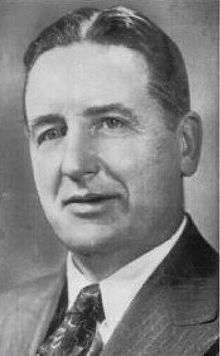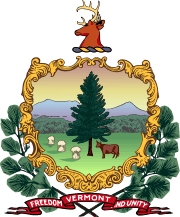Lee E. Emerson
| Lee Earl Emerson | |
|---|---|
 | |
| 69th Governor of Vermont | |
|
In office January 4, 1951 – January 6, 1955 | |
| Lieutenant | Joseph B. Johnson |
| Preceded by | Harold J. Arthur |
| Succeeded by | Joseph B. Johnson |
| 62nd Lieutenant Governor of Vermont | |
|
In office 1945–1949 | |
| Governor |
Mortimer R. Proctor Ernest W. Gibson, Jr. |
| Preceded by | Mortimer R. Proctor |
| Succeeded by | Harold J. Arthur |
| Member of the Vermont Senate | |
|
In office 1943–1945 | |
| Member of the Vermont House of Representatives | |
|
In office 1938 | |
| Personal details | |
| Born |
December 19, 1898 Hardwick, Vermont |
| Died |
May 21, 1976 (aged 77) Berlin, Vermont |
| Political party | Republican |
| Spouse(s) | Dorcas Ball Emerson |
| Alma mater |
Syracuse University George Washington University Law School |
| Profession | Attorney |
| Religion | American Baptist Churches USA |
Lee Earl Emerson (December 19, 1898 – May 21, 1976[1]) was the 69th Governor of Vermont.
Early life
He was born in Hardwick, Vermont, on December 19, 1898, and moved to Barton, Vermont, at the age of 16. He graduated from Barton Academy in 1917, and served in the United States Army during World War I as a member of the Students' Army Training Corps. Emerson received an A.B. from Syracuse University in 1921 and a LL.B. from George Washington University Law School in 1926. He practiced law in Barton.[2]
Political career
He was elected as a Republican to the Vermont House of Representatives in 1938 and served two terms. He was elected Speaker of the House in his second term, serving from 1941 to 1943.[3] He was elected to the Vermont Senate in 1942, served from 1943 to 1945, and was elected President Pro Tempore.[4] He was elected Lieutenant Governor of Vermont in 1944 and 1946, serving from 1945 to 1949.[5]
Throughout much of Vermont history Governors and Lieutenant Governors had served two one-year terms, and later one two-year term as part of the Republican Party's "Mountain Rule." However, Ernest W. Gibson, Jr. had successfully challenged the established structure to win the governorship in 1946.[6] Gibson defeated Emerson in the 1948 Republican primary and went on to win reelection to a second term.[7] Emerson's fellow conservative Harold J. Arthur succeeded Emerson as Lieutenant Governor.[8] When Arthur unexpectedly became governor in 1950 after Gibson resigned to accept a federal judgeship, Arthur served out Gibson's term but declined to run for a full term himself, clearing the way for Emerson's comeback.[9] Emerson was elected Governor in 1950 and reelected in 1952, serving from 1951 to 1955.[10] (Arthur instead ran for the U.S. House and lost the Republican primary to Winston Prouty, who went on to win the general election.)[11]
As Governor, he recommended that Vermont citizens serving in the Korean War be paid a bonus by the state. He supported studies of the feasibility of building a natural gas pipeline for Vermont and of possible racial discrimination in the state. Also during his administration, legislation known as the Forest Act was passed, providing assistance for municipalities to establish forests.[12]
Emerson also played a role in "The Novikoff Affair," in which a tenured University of Vermont professor Alex B. Novikoff was dismissed for alleged Communist sympathies that were never substantiated.[13][14]
Post gubernatorial career
In 1958, he ran unsuccessfully for the United States Senate, losing the Republican nomination to Winston Prouty.[15]
In 1960 Emerson was an unsuccessful candidate for the Republican nomination for Vermont's lone seat in the United States House of Representatives, losing to incumbent Governor Robert T. Stafford.[16] Stafford went on to victory in the general election, defeating one term incumbent William H. Meyer, the first Democrat elected statewide in more than 100 years.[17] (Myer had defeated Harold Arthur in the 1958 general election for the U.S. House seat.)[18]
Personal
Emerson married Dorcas M. Ball on August 4, 1927. They had two children, Nancy and Cynthia.[19]
Death and burial
He died in Berlin, Vermont, on May 26, 1976.[20] He is buried in Barton.[21]
Footnotes
- ↑ National Governors Association
- ↑ "Lee E. Emerson entry", Current Biography Yearbook, by H. W. Wilson Company, 1954, page 183
- ↑ "Vermont Archives". Speakers of the House. Retrieved December 25, 2006.
- ↑ "Vermont State Legislature". Vermont Senate Presidents Pro Tempore. Retrieved December 25, 2006.
- ↑ "Vermont Secretary of State," Vermont Legislative Directory and State Manual, 1981, page 104
- ↑ "The Vermont Encyclopedia," By John J. Duffy, Samuel B. Hand and Ralph H. Orth, 2003, page 96
- ↑ "Yankee Politics in Rural Vermont," by Frank M. Bryan, 1974, page 91
- ↑ "Harold J. Arthur entry," The National Cyclopaedia of American Biography, by James Terry White, Volume 57, 1977, page 135
- ↑ "The Vermont Political Tradition," by William T. Doyle, 1987, page 288
- ↑ "Vermont Archives", Vermont Governors, Terms of Service
- ↑ "Vermont Archives", Primary Election Results, 1950 Republican Party
- ↑ "National Governor's Association". Vermont Governor Lee E. Emerson. Retrieved December 26, 2006.
- ↑ "Vermont Historical Society," The Case of Alex B. Novikoff
- ↑ "New York Times," Alex B. Novikoff Dies; Professor and Biologist, January 11, 1987
- ↑ "Vermont Archives", Primary Election Results, 1958, Republican Party
- ↑ "Vermont Archives", Primary Election Results, 1960, Republican Party
- ↑ "The Bob Mitchell Years: An Anthology of a Half Century of Editorial Writing," by Robert W. Mitchell, Rutland Herald, 1994, page 447
- ↑ "New York Times", Democrat Fights Vermont Battle; Meyer Believed in Trouble in House Contest Against Gov. Robert T. Stafford, by John H. Fenton, October 20, 1960
- ↑ Burlington Free Press Obituaries 02/2001 « Vermont History and Genealogy
- ↑ "University of Vermont". Lee E. Emerson. Retrieved December 25, 2006.
- ↑ "RootsWeb". Welcome O. Brown Cemetery, Barton, Vt. Retrieved December 26, 2006.
External links
- The Political Graveyard
- Inventory of the Lee E. Emerson Papers, Special Collections, University of Vermont Library
| Political offices | ||
|---|---|---|
| Preceded by Oscar L. Shepard |
Speaker of the Vermont House of Representatives 1941 – 1943 |
Succeeded by Asa S. Bloomer |
| Preceded by Joseph H. Denny |
President pro tempore of the Vermont State Senate 1943 – 1945 |
Succeeded by John A. M. Hinsman |
| Preceded by Mortimer R. Proctor |
Lieutenant Governor of Vermont 1945—1949 |
Succeeded by Harold J. Arthur |
| Preceded by Harold J. Arthur |
Governor of Vermont 1951–1955 |
Succeeded by Robert T. Stafford |
